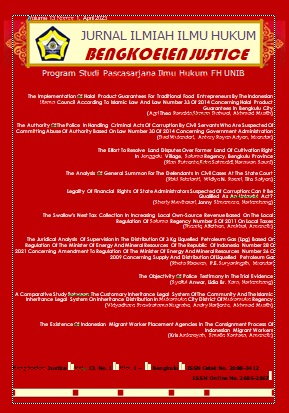Main Article Content
Abstract
Crime and drug abuse in Indonesia have been considered severe cases. As in the status quo, the police are now intensively arresting perpetrators of drug abuse and ensuring that the law enforcement process runs against the drug users to make them responsible for their actions before the law until the trial. In practice, during the trial evidence, the police give testimony in the court as the party who arrests the suspected perpetrators of drug abuse. However, the testimony from the police who act as the witness for the drug abuse cases is vulnerable to the nuances of case engineering or torture in obtaining information from the suspect. This study aims to find out and analyze three things: 1. the objectivity of the testimony from the police who arrested the drug abusers in evidence following the Criminal Procedure Code. 2. the considerations of the judges on the testimony of the police who arrested the drug abusers at the Bengkulu District Court Class IA in case of Number: 271/Pid.Sus/2020/PN Bgl.) and 3. the decision of Cassation of the Supreme Court of the Republic of Indonesia Number: 1531 K/Pid.Sus/2010, related to the objectivity of the police testimony in evidence following the Criminal Procedure Code. This study employed a statutory and conceptual approach related to the judge's consideration of the testimony of the police who arrested the drug abusers. Considerably, it is not appropriate to present the police testimony as a fact witness due to particular bias on the confirmation of the results from the investigation, in which the police are most likely to have an interest in the success of his case in court.
Keywords: Objectivity, Testimony, Police, Arrest.
Article Details
Copyright (c) 2023 Syaiful Anwar, Lidia Br. Karo, Herlambang Herlambang

This work is licensed under a Creative Commons Attribution-ShareAlike 4.0 International License.

Ciptaan disebarluaskan di bawah Lisensi Creative Commons Atribusi-BerbagiSerupa 4.0 Internasional.
